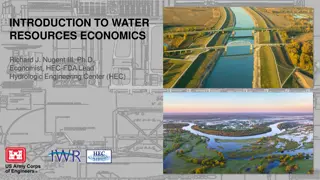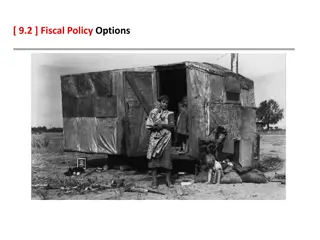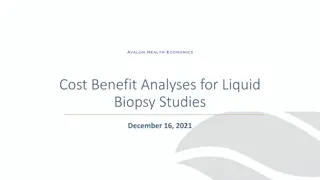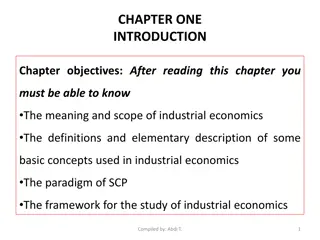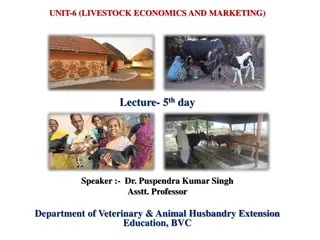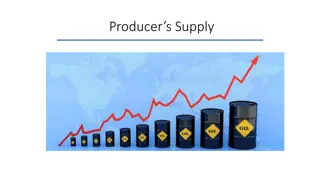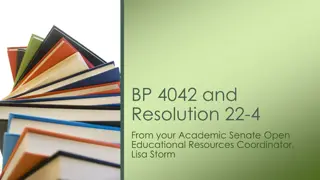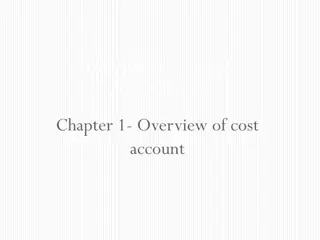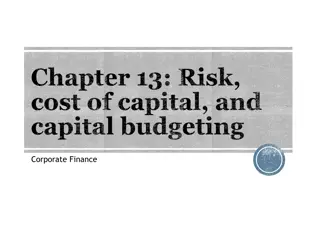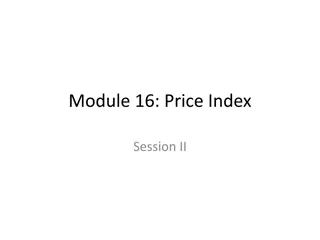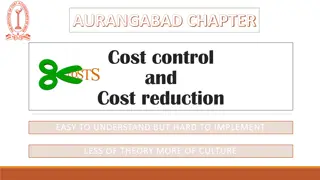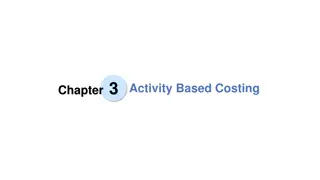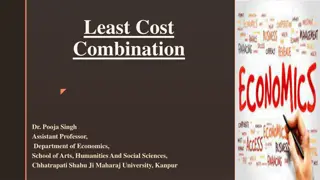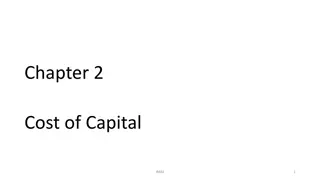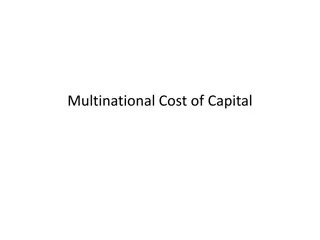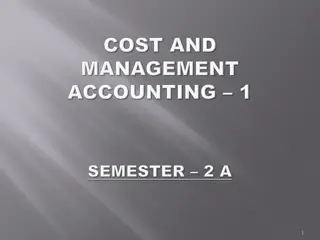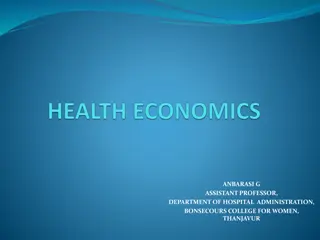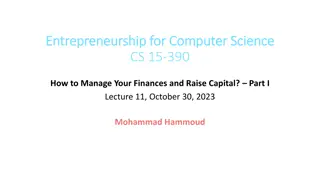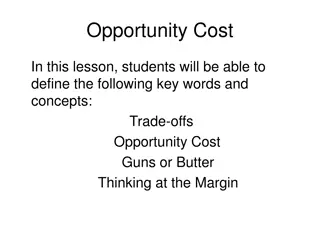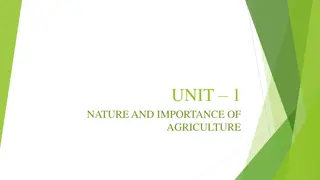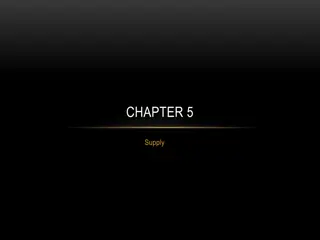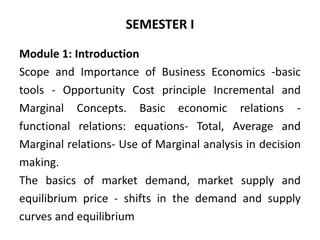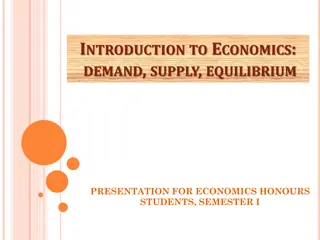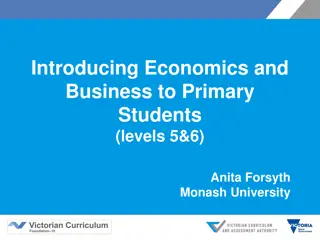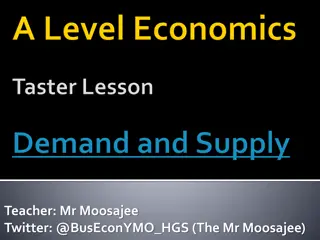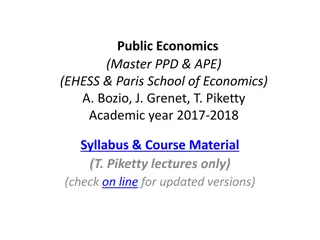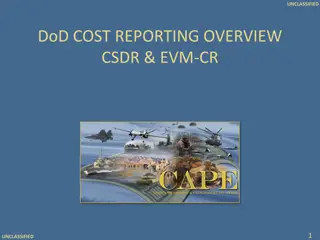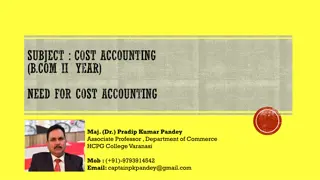Understanding Water Resources Economics
This resource introduces the principles of water resources economics, focusing on decision-making, cost-benefit analysis, and the role of economics in flood risk management and national development. It discusses how economics influences individual and government decisions in managing limited resourc
3 views • 14 slides
Introduction to Experimental Economics by John Hey: A Comprehensive Overview
Explore the interconnected realms of Experimental Economics and Behavioral Economics through the insightful lectures of John Hey, an Emeritus Professor at the University of York. Discover the methodology of testing economic theories for validity and the practical applications of experimental economi
1 views • 58 slides
Understanding Water Resources Economics and Public Policy
Explore the foundations of water resources economics through topics such as decision-making, public economics perspectives, flood control acts, cost-benefit analysis, and optimization. Gain insights into how economics influences individual, household, organizational, and governmental decision-making
4 views • 15 slides
Explore Economics as a Leaving Certificate Subject
Economics as a Leaving Certificate subject prepares students for diverse career paths in business, finance, and management. The course includes a research project and a structured exam format. With a focus on theory, practical application, and real-world economic concepts, Economics equips students
5 views • 11 slides
Elevate Your Scores Master the IB Economics (SL and HL) Examination
Unlock your potential and excel in the IB Economics (SL and HL) Examination with our comprehensive study resources. Access practice exams, study guides, and expert tips to boost your scores. Start your journey towards academic success now!\nClick Here to Get IB-Economics Dumps With 16 USD Discount C
0 views • 7 slides
Understanding the Positive/Normative Distinction in Economics
Textbooks in economics often teach the Positive/Normative Distinction, where Positive Economics deals with facts and Normative Economics focuses on values and opinions. This distinction is a point of debate among scholars, with some arguing that values are intrinsic to all analysis. The debate also
0 views • 28 slides
Understanding Fiscal Policy Options in Economics
Explore the evolution of economic theories including classical economics, demand-side economics, and supply-side economics. Learn about the impact of key figures like John Maynard Keynes and Milton Friedman on fiscal policy decisions and the U.S. economy. Delve into the strategies employed during th
0 views • 18 slides
Comprehensive Cost Management Training Objectives
This detailed training agenda outlines a comprehensive program focusing on cost management, including an overview of cost management importance, cost object definition, cost assignment, analysis, and reporting. It covers topics such as understanding cost models, cost allocations, various types of an
2 views • 41 slides
Cost-Benefit Analyses for Liquid Biopsy Studies: Understanding Health Economics and Decision Making
Health economics and decision making play a crucial role in evaluating the clinical utility and cost-effectiveness of liquid biopsies. Economic models such as cost-effectiveness analyses help in determining the incremental cost-effectiveness ratio (ICER) of interventions. Studies have shown varying
0 views • 23 slides
Overview of Industrial Economics: Scope, Evolution, and Challenges
Industrial economics delves into economic issues of firms and industries, exploring their interactions with society. This chapter discusses the meaning and scope of industrial economics, its historical evolution from classical to contemporary theories, traditional concerns like firm performance and
0 views • 71 slides
Understanding Livestock Economics and Marketing: Theories and Concepts
Explore the essential theories and concepts in livestock economics and marketing discussed by Dr. Puspendra Kumar Singh. Topics include cost theories, cost functions, production functions, fixed costs, variable costs, and their relevance to managerial decisions and market situations.
1 views • 39 slides
Understanding Producer Economics: Concepts and Strategies
Explore key concepts in producer economics such as supply, cost minimization, revenue maximization, and cost structures. Discover the importance of time frames, input-cost relationships, and factors affecting average variable costs in the producer's decision-making process.
0 views • 22 slides
Academic Senate Resolutions and Low-Cost Thresholds in Higher Education
The Academic Senate addresses the adoption of open educational resources (OER) and low-cost materials to support academic freedom and compliance with legislative requirements. The resolution discusses the definition of low-cost resources and the variability among California Community Colleges in set
2 views • 9 slides
Understanding Cost Accounting Essentials
This overview delves into topics such as financial accounting, classification of accounts, cost ascertainment, and management accounting. It covers the meaning of cost, methods and techniques of costing, advantages and limitations of cost accounting systems, and essentials for a robust cost accounti
4 views • 27 slides
Understanding Risk, Cost of Capital, and Capital Budgeting in Corporate Finance
Explore the concepts of risk, cost of capital, and capital budgeting in corporate finance, including the Capital Asset Pricing Model (CAPM), cost of equity, beta estimation, and cost of capital. Learn how to reduce the cost of capital and understand the impact of reducing the Weighted Average Cost o
0 views • 20 slides
Understanding Price Indices in Economics
Exploring the concept of price indices in economics, focusing on composite price indexes, weighted and unweighted indices, and their importance in measuring relative prices. A practical illustration using the example of tea consumption showcases how price indices help in understanding cost changes o
0 views • 31 slides
Cost Control and Cost Reduction Strategies in Business: Understanding Implementation Challenges
Understanding the concepts of cost control and cost reduction is crucial for businesses, but implementing them can be challenging. This chapter explores the influencing factors for success in cost control and reduction, emphasizing the importance of cultural aspects, leadership, and management appro
1 views • 15 slides
Understanding Activity-Based Costing (ABC) in Cost Management
Activity-Based Costing (ABC) is a strategic costing method that allocates overhead costs to products based on activities. It offers benefits such as accurate cost allocation and identifying cost drivers but also has challenges due to increased complexity and customization. ABC differs from tradition
1 views • 15 slides
Principles of Least Cost Combination in Economics
In economics, the principle of least cost combination involves determining the optimal combination of factors of production (such as capital and labor) that allows a firm to achieve maximum output at minimum cost. This is achieved by identifying the point where the isoquant curve intersects the isoc
1 views • 4 slides
Understanding the Cost of Capital in Finance
The cost of capital is crucial for businesses to determine the average cost of their finance. The Weighted Average Cost of Capital (WACC) is used as a discount rate in financial calculations. It involves estimating the cost of each source of finance and calculating a weighted average. Additionally,
0 views • 14 slides
Understanding Multinational Cost of Capital
Multinational corporations determine their cost of capital based on the cost of debt and equity. The cost of debt includes the interest rate and credit risk premium, while the cost of equity reflects the risk premium investors demand. Estimating an MNC's cost of capital involves assessing these comp
0 views • 24 slides
Understanding Cost Accounting: Techniques and Processes
Cost accounting is a specialized branch of accounting that involves the accumulation, assignment, and control of costs. It encompasses techniques like ascertainment of costs, estimation of costs, and cost control to aid in decision-making. Cost accounting plays a crucial role in budgeting, standard
2 views • 11 slides
Overview of Health Economics: Key Concepts and Principles
Health economics is a vital field that explores the relationship between economics and healthcare, focusing on efficiency, value, and behavior in health production and consumption. It encompasses topics like determinants of health, demand and supply of healthcare, health sector budgeting, and equity
1 views • 12 slides
Qualities of a Successful Economics Teacher
The role of an economics teacher is crucial in shaping students' understanding and knowledge. The qualities of an effective economics teacher include expertise in economics, mastery of teaching methodologies, use of innovative teaching techniques, and a commitment to ongoing professional development
1 views • 6 slides
Financial Intelligence and Capital Management in Entrepreneurship for Computer Science
Understanding financial intelligence is crucial for success in business. Entrepreneurs must grasp unit economics, interpret financial statements, and raise capital effectively. Unit economics is key to determining if a venture is sustainable, where the Lifetime Value of an Acquired Customer must exc
3 views • 27 slides
Insights into Vertical Integration in 19th Century America Through Transaction Cost Economics
Exploring Alfred Chandler's work and its application in understanding the evolution of business organizations in the 19th and early 20th centuries in America. The article applies transaction cost theory to explain historical shifts towards vertical integration, emphasizing the cost-efficiency of int
2 views • 16 slides
Introduction to Industrial Costing: Understanding Cost Types and Accounting Systems
Explore the fundamentals of industrial costing, including different cost types and accounting systems such as actual cost accounting, normal cost accounting, and standard cost accounting. Learn about cost data control, tasks of cost accounting, and the integration of cost type accounting in cost and
1 views • 24 slides
Understanding Trade-offs and Opportunity Cost in Economics
Learn the key concepts of trade-offs and opportunity cost in economics through engaging visuals and explanations. Explore how scarcity influences decision-making for individuals, businesses, and governments, with examples such as Guns or Butter trade-offs. Understand the significance of choosing one
0 views • 14 slides
Understanding the Significance of Agriculture Economics in India
Agriculture plays a crucial role in the Indian economy, contributing significantly to GDP and rural livelihoods. Agriculture Economics involves the study of resource allocation in the production, distribution, and consumption of agricultural goods. This branch of economics blends principles from gen
0 views • 24 slides
Understanding Supply and Costs of Production in Economics
Supply in economics refers to the availability of goods and services in the market, influenced by factors like the law of supply, supply schedules, and supply elasticity. Cost of production involves considering marginal benefits and costs in determining output levels. These concepts are vital in und
0 views • 20 slides
Understanding Costs, Revenue, and Profit in Economics
Cost is the expenditure on goods or services, including opportunity cost. It can be explicit or implicit. Measuring opportunity cost involves factors of production and sacrifices. Economic profit considers opportunity cost while accounting profit does not. Production in the short run depends on inpu
0 views • 53 slides
Managing Summer Cost Share for Faculty with 9-Month Appointments
Explore the process of setting up and monitoring summer cost share for faculty with 9-month appointments. Learn why cost share for summer may not display on the FEC, how GCA establishes cost share using the Cost Share Module, and how departments should adjust the FEC to reflect summer cost share acc
0 views • 15 slides
Understanding Business Economics Fundamentals
Business economics delves into the efficient allocation of scarce resources within a business context, focusing on principles such as opportunity cost, marginal analysis, market demand and supply, and strategic decision-making. It encompasses microeconomics and macroeconomics, studying both individu
0 views • 37 slides
Joint UNDP, UNFPA, UNICEF, UN Women Executive Boards Cost Recovery Briefing
Briefing on cost recovery for the joint Executive Boards of UNDP, UNFPA, UNICEF, and UN Women, covering topics such as feedback on cost recovery, role of core resources, cost recovery models using a LEGO approach, harmonization efforts, guidance for Executive Boards, and next steps towards proposing
0 views • 42 slides
Understanding Economics: Demand, Supply, and Equilibrium
Explore the fundamental concepts of economics, including the nature and scope of economics, demand, and its determinants. Learn about normative and positive economics, microeconomics, macroeconomics, and the factors affecting demand such as income, price of the good, and complementary goods. Gain in
0 views • 19 slides
Introduction to Economics & Business for Upper Primary Students
This webinar by Anita Forsyth from Monash University introduces economics concepts to upper primary students (levels 5 & 6). Key topics covered include resources, needs, wants, production, goods, services, incentives, scarcity, opportunity cost, economic decision-making, and ethical awareness. The s
0 views • 24 slides
Understanding Economics: Explore the World of Scarce Resources, Prices, Government Policies, and Global Impacts
Delve into the intriguing realm of economics with Mr. Moosajee at HGS! Unravel the mysteries behind how scarce resources are allocated, why prices fluctuate, the impact of government policies, concerns about inflation, strategies for reducing unemployment, and more. Discover the relevance of economi
0 views • 20 slides
Public Economics Course Summary - EHESS & Paris School of Economics
The Public Economics course at EHESS & Paris School of Economics offers an introduction to taxation history, government intervention theories, and policy incidence across developed and developing countries. The syllabus covers topics like welfare analysis, wealth taxation, and optimal taxation strat
0 views • 11 slides
Defense Cost Reporting and Systems Overview
Defense Cost Analysis and Reporting Systems (CSDR) provide the cost community with essential data for developing independent cost estimates within major defense acquisition programs. The Defense Automated Cost Information Management System (DACIMS) offers instant access to historical cost informatio
0 views • 19 slides
Importance of Cost Accounting in Business Management
Cost accounting plays a crucial role in modern business environments where cost effectiveness and quality consciousness are vital for success. This branch of accounting helps in planning, controlling, and determining the costs of products or services, providing essential data for efficient managemen
0 views • 6 slides


